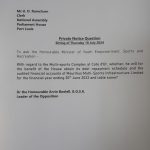From India to Kenya to Palestine
So many human groups have in the past launched a struggle (in some case a war) for their liberation and establishment of an independent country. For example the American war of independence against the British.In India the struggles for independence from Britainwasled by Gandhi and Nehru.In the 20th century, African independence movements were witnessed, as a wave of struggles for independence from European/colonialist rule. For example Kenya, led by Jomo Kenyatta, Algeria for its liberation from France, Mozambique and Angolafor liberation from Portuguese rule, Malagasy nationalists revolt against the French as from March 1947,Eritrea from being an Italian colony from 1890–1941, then having to struggle against domination by Ethiopia, Namibia against German rule, South Africa led by Nelson Mandela against internal apartheid rule – and so many others.
Now, let us-let the world-recognise the ongoing struggle /war of thePalestinians peoplefor their land,freedom and independence from Israeli control and rule.
How did populations fight for their independence? The Kikuyu under Jomo Kenyatta had no choice against the complete refusal of the British to release the extremely fertile up-country lands which they took and of course refused any form of self-rule or independence. So they took arms and for years fought, during the Mau-Mau revolt.
Years of nonviolent resistance to British rule, led by Mohandas Gandhi and Jawaharlal Nehru, eventually resulted in Indian independence in 1947. But large-scale communal violence took place before and after the subcontinent partition into two separate states – India and Pakistan.
Palestine: Palestine as a region once stretched from the shores of the Mediterranean eastwards beyond the Jordan river. Before 1948, Palestine was home to a diverse population of Arabs, Jews, and Christians. The six million Palestinians today are scattered throughout the Middle East (in particular in Jordan where they have been well received and integrated), in North Africa, Europe, the Americas, while 2 million are concentrated in the tiny Gaza strip plus in the West Bank. In 1948 after World War II the United Nations voted to partition Palestine (the region) between Jews and Arabs. Israel was thus created: it thrived and developed, with a population of over 6 million. An independent Palestinian state was never established. Several wars ensured including the violent Six Day War of 1967. After which violence continued with the Palestinian intifadaand Israeli military and police control. While all the time a gradual taking over of Palestinian lands (In the West Bank, Jewish settlements now account for up to 30% of the population).
The Israeli leadership is looking for ways to guarantee the continued incorporation of the largest possible portions of the West Bank into Israel and to guarantee full and permanent domination of the Palestinians in order to thwart their ability to challenge these policies. Their struggle dates way back to 1947.
It is important to note that none of the Israeli options so far offer a genuine partition of the land of Palestine into two independent states.
The future, in peace not at war!
“The Palestinians are an immensely varied and sophisticated people with a very high literacy rate. They are Muslims as well as Christians” (National Geographic, June 1992). The 6 million of them absolutely deserve their independent state, completely out of Israeli control, as likely to be guaranteed by the United Nations, Jordan, Qatar, Egypt and now the EU and the USA of Biden. So this 2-state solution (Israel and Palestine) is the only solution for peaceful and just living. Israel was establishes in May 1948, will Palestine be established early in 2024? Seventy-five years too late, but better late than never!
As soon as the exchange of hostages and prisoners is complete, followed by an extension of the ceasefire, control over the weapons of Hamas, negotiations and discussions must open to delimit each state and set its borders, with no reduction whatsoever of Israeli territory but the definition of a new Palestine. A possible good basis for the 2-state solution is the Ecological Road Map (ERM) of Atchia, giving Palestine access to land, sea, fresh water and freedom of passage, but not based on historical factors.
After such an agreement, the UN will declare and recognize a new independent State of Palestine, with its own airport, port, passports, freedom of movement to which all citizens of the world are entitled, and which most have in practice. The reconstruction of Gaza and other areas can then begin. There is hope.
Dr Michael ATCHIA
(Former United Nations Programme Director)
26th November 2023





![[Poetry corner] Mystical poem: The greatness of Allah](https://sundaytimesmauritius.com/wp-content/uploads/2024/06/Cassam-Tupsy2-218x150.jpg)




![[URGENT] Le PMSD convoque son comité exécutif cet après-midi](https://sundaytimesmauritius.com/wp-content/uploads/2024/07/x-150x150.png)



![[URGENT] Le PMSD convoque son comité exécutif cet après-midi](https://sundaytimesmauritius.com/wp-content/uploads/2024/07/x-100x70.png)
